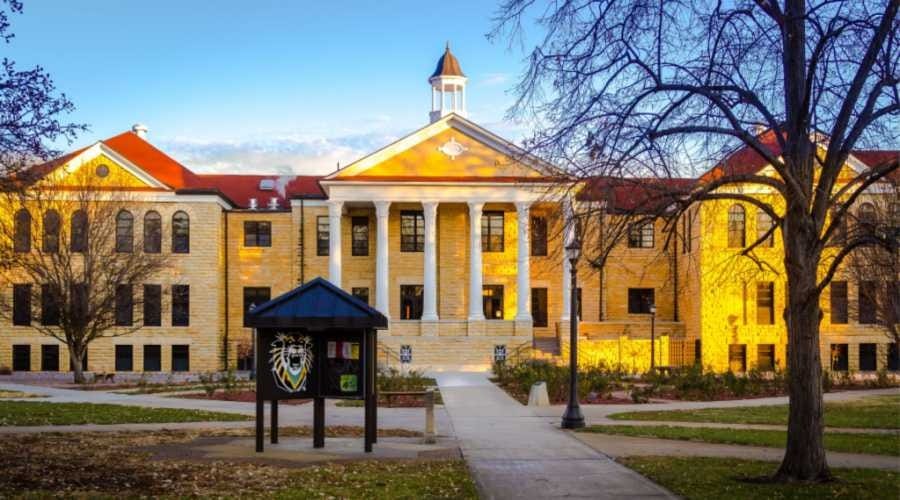Getting through college can be challenging, and there are many colleges that accept low GPA transfer students.

Whether you were distracted by extracurricular activities, struggled with difficult assignments, or had unexpected obligations preventing you from attending classes on time, ending up with poor grades doesn’t have to prevent you from transferring to a reputable school.
Editorial Listing ShortCode:
There are a number of reasons why students decide to transfer schools, from changing career goals to relocation or simply wanting to get a fresh start at a new college. There are a number of ways that you can go about transferring colleges to finish your degree program or begin a new course of study, even with bad grades as there are many universities that accept low GPAs.
Colleges That Accept Low GPA

If you are looking into transferring schools as you pursue your education but have a low Grade Point Average (GPA), there are options with universities and colleges who accept low GPAs. While most colleges look at your GPA, it is only one factor among many that are considered for admissions.
Other factors that colleges consider when considering a low college GPA transfer include:
- Trends and patterns in your grades
- Personal statements and letters of intent
- Extracurricular activities
- References
- Volunteer and/or work experience
- SAT or ACT scores (depending on how long you’ve been in college)
Colleges and universities can vary greatly on which factors they place the most importance on, with many offering different levels of acceptance that may be helpful to you.
Editorial Listing ShortCode:
Some colleges with low GPA requirements offer conditional acceptance, which may allow you time to improve your GPA or maintain a certain GPA after admission. Other conditions may include taking prerequisite courses or retaking a specific course for a minimum grade. Once these conditions are met, you can be fully accepted.
Conditional acceptance can be a good way to prove to the school that you have what it takes to successfully stay enrolled in their program.You may also look into schools with open admissions. These colleges have a nonselective admissions process and allow all students with a high school diploma or GED to enroll.
In addition, some schools admit a select number of students on alternative admissions. While these students do not meet traditional high school requirements, they demonstrate potential for success. In some cases, a high school transcript is not required.
If you are looking into transfer friendly colleges, many colleges and state universities accept students with low GPAs. While many schools only accept and allow transfer credits for classes with a minimum grade, you may still be accepted even if all of your credits don’t transfer.
Lastly, there are state schools that have less competitive admissions requirements and will accept students with lower GPAs. As you look into transferring, consider talking to an admissions counselor. Many schools with generous transfer policies have counselors designated for assisting potential transfer students who can best advise you.
What is a Bad GPA for College?

A GPA is a standard system for translating letter grades into a point scale. A standard, unweighted GPA is calculated on a 4.0 scale, used by most colleges.
On a scale of 4.0,
- 4.0 = A = 90 – 100%
- 3.0 = B = 80 – 89%
- 2.0 = C = 70 – 79%
- 1.0 = D = 60 – 69%
Your GPA is calculated from the average grade in each class. The standard for a bad GPA largely depends on the school’s criteria. While a GPA below 3.0 is below the national average, many students are accepted to schools with GPAs below 3.0.
You may also find some schools consider weighted and unweighted GPAs. Unweighted GPAs do not take into consideration a course’s difficulty level. Weighted GPAs may be on a 4.5 or 5.0 scale, considering a course’s difficulty. An A received in an AP Course, for example, may be weighted and scored as a 5.0.
Do Colleges Care About GPA When Transferring?

While colleges care about your GPA as a representation of your academic history, it’s not the only consideration they take into account when accepting transfer students.
Some low GPA requirement colleges will ask for a letter of intent outlining your professional goals and plans. This letter can be a great opportunity to highlight your potential at their school. Your resume, including work, volunteer, and community service experience, can also be a factor that colleges with low GPA requirements will consider.
Editorial Listing ShortCode:
Some schools may also allow you to take an online assessment that showcases your ability that isn’t reflected in your GPA.
I Passed All of My Classes With a C or Better

If you have an overall positive academic record but had a couple of courses end up with a final grade of a C, there are still many options to transfer to another university. Most colleges will accept transfer credits that were completed with a C average or above.
Certain competitive programs may have stricter policies for transferring credits or overall GPA. For example, if you are looking to transfer credits for a medical degree or law degree program, their additional requirements for entry may require a higher GPA than less specialized degrees.
When you are ready to begin the process of transferring schools with classes completed with a C average or better, the first step would be to sit down with your school’s academic advisor or counselor to go over your options. Transferring to a school that has an articulation agreement with your current school may be a wise choice to help you have a smooth transition into your new university.
I Passed All of My Classes With a D or Better

If you ended up with a few D’s throughout the course of your college classes, there is no need to panic – but you may need to get creative to successfully transfer to your school of choice.
While most schools accept the transfer of classes with a C or better, there are accredited universities that have more flexible policies and are willing to accept a D grade. Providing your prospective school with evidence of appropriate coursework from an accredited institution or meeting face-to-face with their college representatives may be required to give you the extra edge in gaining acceptance into their program.
Another option that you might want to consider is staying at your current school long enough to complete all of the requirements to earn an associate’s level degree. Once you have earned this degree, you can try to apply to other colleges that offer
I Failed a Few Classes

If you have failed a few of your classes but still want to transfer schools, it may feel like you are facing an uphill battle. However, don’t lose hope!
There are many reasons that students fail classes, and it doesn’t mean that you aren’t smart or capable of completing your education. If you are willing to spend a little more time at your current institution, consider retaking your failed course and give it everything you have to earn a better grade.
Most schools also offer tutoring programs to help students struggling in classes. Although a failed class will still appear on your transcripts, if you pass the course a second time with a higher grade the previous F will no longer be factored into your GPA – making transferring schools much easier!
Another viable option for those who have failed general education classes is to consider taking a CLEP test. While most schools accept CLEP, be sure to check into the specific policies of your desired school. If you pass the CLEP test, you can then receive credit for that course at your new university.
Other Factors for College Admissions

While admissions criteria vary from school to school, GPA is just one factor considered. Listed below are some common factors that colleges that accept low GPAs take into consideration.
- Personal Statement: This is a chance for the admissions committee to hear directly from you in your own words – your past experiences, future goals, and why you deserve a place in their school.
- SAT / ACT Scores: While not all schools require test scores, if you scored highly on either test, submitting your scores can help. If you’re only a year or two into your degree when transferring, some schools may still consider your test scores.
- Extracurricular Activities: Highlighting two or three activities that showcase your leadership, community service, or work ethic can help set you apart.
- Letters of Recommendation: Recommendations from a trusted professional that reinforce who you are as a person can boost your application significantly.
- Resume: Highlighting your work experience can demonstrate your work ethic and your ability to manage time and responsibilities.
Schools also place varying degrees of emphasis on these factors. A liberal arts college may highly value your letters of recommendation, while a public school may focus more on your test scores.
Do Grades Transfer When You Transfer Colleges?
When transferring schools, you can receive credit for courses you’ve already completed. Most schools give credit for classes in which you earned a C or better.
After transferring, the credits you earned in these courses will carry over, but not the individual letter grade. Your GPA at a new school will be a clean slate, only reflecting your grades earned from that point forward.
What Happens If My School of Choice Won’t Accept My Grades for Transfer?

Many students have an idea of which college they want to go to when considering a transfer but you may wonder what you do if your chosen school doesn’t accept credits from classes that you completed with less than a C?
The first thing that you need to ask yourself is if you are flexible about your school choice. If you feel that you must go to a particular school, go to that college’s website or make an appointment with an academic counselor to discuss your options.
Editorial Listing ShortCode:
It may be possible for you to still transfer to the new school and not receive credit for any classes that you completed with less than a C average. If you only have one class with a poor grade and are willing to retake that course, then this might be an option that will work for you.
Many accredited universities offer online classes that have more generous transfer policies than traditional brick-and-mortar schools. This can be a great chance for students to not only receive credit for the courses they have already completed but also have the opportunity to work on a more flexible schedule that may help improve their grades in the future.
What are Articulation Agreements?

If you are considering transferring schools, you have likely heard the term articulation agreement or transfer agreement. So what are these agreements and why are they important?
An articulation agreement is a formal, official written agreement between colleges or universities that aims to simplify the transfer process for students. Many schools, such as community colleges, have articulation agreements with specific universities that allow students to easily transfer their credits over for advanced standing, entry, or transfer into specific similar degree programs.
There are several advantages to choosing to transfer to a school that already has an articulation agreement in place with your current college, including:
- Coursework matching for a smooth transition
- Chance to transfer an entire Associate’s Degree without question
- Clear outlines for transfer and accepted course grades
Most community colleges with articulation agreements will allow students to transfer to a new school (even with less than stellar grades) if they have completed all the requirements of their AA or AS degree program first. If this is an option for you, you will then be able to start fresh at your new school because your transfer credits will not be factored into your new GPA.
Many schools publish their articulation agreements on their websites, and it is also a good idea to make an appointment with an academic advisor to go over your options and your school’s specific policies.
What Is a Degree Completion Program?

If you have completed several semesters of school and only have one or two classes with poor grades, a degree completion program may be an option for you. These programs are designed for motivated adult learners to transfer into a school to complete their degree.
Editorial Listing ShortCode:
Many of these programs seek students who have a solid GPA, but they also look at factors beyond your grades, such as:
- Overall academic preparation and motivation
- A minimum number of transferable credits from an accredited school (typically 52-64 credits)
- Completion of specific undergraduate courses
- Life experience and work or professional activities
While degree completion programs may not be viable if you have minimal credits and multiple courses with less than a C average, it is worth checking into the transfer policy of schools offering these programs to see if you qualify.
What is Conditional Acceptance?

Conditional acceptance means that a school you applied to will accept you with the agreement that you meet specific criteria detailed by the school. The criteria for conditional acceptance will vary depending on the school and what they want to see you demonstrate.
They may require you to maintain a certain GPA in your first year or take a course and get a minimum grade before admittance. Schools that offer conditional acceptance want to admit you but need you to demonstrate your commitment to your education. Once the conditions are met, you can then be fully admitted into the school’s program.
What is an Open Admission Policy?

Schools with an open admission policy accept all students with a high school diploma, or frequently a GED is also accepted.
Open admissions schools are considered non-competitive, meaning they don’t compare benchmarks like GPAs or test scores. Open admissions policies help students with lower GPAs or other limiting factors pursue their education regardless of their educational history.
Editorial Listing ShortCode:
Community colleges and four-year schools that offer associate’s degrees frequently have open admissions policies. Instead of using SAT/ACT or other standardized tests, open admissions schools frequently use placement tests to assess student capabilities.
Is a 1.8 GPA Good?

With the national GPA for high school students around 3.0, 1.8 is a good bit below average and will limit the schools that will accept you. A 1.8 GPA means you averaged C’s to C-’s in your classes.
While a 1.8 GPA will limit your acceptance to certain schools, keep in mind all other factors that schools consider, including test scores, recommendations, and work experience. Schools may also consider whether or not your GPA is weighted and the difficulty of the courses you’ve taken.
Some schools will accept students with a 1.8 GPA. You may also consider schools with open admissions or receive conditional acceptance from a school.
Is a 2.0 GPA Bad?

A 2.0 GPA means you earned C’s in most of your classes. You can still apply and be accepted into schools with a 2.0 GPA.
Considering that schools consider a variety of other factors, you will want to showcase your abilities as much as possible in those other areas. If you have work experience, volunteer or community service experience, outline those experiences in a detailed resume showcasing your work ethic and time management.
Editorial Listing ShortCode:
Letters of recommendation and a personal letter of intent can highlight who you are beyond just the numbers in your GPA. If you have strong ACT or SAT scores, submit those to demonstrate your academic abilities not demonstrated through your GPA.
Best Colleges That Accept Low GPA Requirements
Methodology: The following school list is in alphabetical order. To be included, a college or university must be regionally accredited, offer degree programs online or in a hybrid format and accept low GPA requirements.

Albany State University accepts transfer students with lower GPAs. Students transferring from another college must have a C or higher in all credits they wish to transfer. Students seeking an associate degree may transfer in up to 42 qualifying credit hours, while those pursuing a bachelor’s degree may transfer in up to 90 qualifying credit hours. Areas of study offered at the school include criminal justice and psychology.
Albany State University is accredited by the Southern Association of Colleges and Schools Commission on Colleges.

American InterContinental University seeks to make it possible for students to enter graduate school, even if they have a low undergraduate GPA. Graduate school applicants must have a 2.0 GPA or higher. AIU offers 13 online graduate degree programs. Some programs can potentially be completed in just 12 months. Areas of study offered include education, healthcare, and IT management.
American InterContinental University is accredited by the Higher Learning Commission.

Students may be admitted to Anna Maria College’s online bachelor’s programs even with a low GPA. Prospective students must have a GPA of 2.0 or higher to apply. Students can choose from four areas of study: psychology, criminal justice, fire science, and health administration. Courses are 8 weeks long, and there are six start dates offered throughout the year.
Anna Maria College is accredited by the New England Commission of Higher Education.

Arkansas Baptist College is an HBCU that offers unconditional admission to all students who meet its admission requirements. In general, at least a 2.0 GPA is required to apply, but ABC may make exceptions with conditional admission. ABC doesn’t currently offer online degrees, but some programs offer online courses. Some fields of study offered include accounting and religious studies.
Arkansas Baptist College is accredited by the Higher Learning Commission.

Arkansas Tech University accepts applications from transfer students who have 24 or more qualifying credits and a 2.0 cumulative GPA. Students transferring less than 24 credits must submit high school transcripts demonstrating they earned at least a 2.0 GPA and standardized test scores. ATU offers 11 online bachelor’s degree programs. Areas of study offered include creative writing and political science.
Arkansas Tech University is accredited by the Higher Learning Commission.

California State University—San Bernardino requires a 2.5 GPA for California residents and a 3.0 GPA for out-of-state applicants. The school may consider applicants with GPAs lower than 2.5 based on supplemental material. CSUSB offers online and blended programs. Areas of study offered include administration, criminal justice, and social sciences.
California State University – San Bernardino is accredited by the Western Association of Schools and Colleges.

Capella University is designed for adults looking to further their education and careers. Students must be 24 to apply for a bachelor’s program. Each program has slightly different requirements, but many don’t have a minimum GPA requirement. Capella University’s programs are completely online, and students can choose between guided and self-led programs. Areas of study offered include business and health sciences.
Capella University is accredited by the Higher Learning Commission.

Central State University allows undergraduate students with a minimum cumulative GPA of 2.2 from an accredited institution to apply for transfer. These students must have at least 45 qualifying transfer credits. Otherwise, they’ll need to apply with their high school transcripts and still need a 2.2 GPA. CSU offers a limited number of online degree programs. Areas of study offered include education and business.
Central State University is accredited by the Higher Learning Commission.

Colorado Technical University offers a lot of support for students who want to transfer from other institutions. Students need at least a 2.0 GPA in previous college coursework to apply. Students may be able to transfer up to 75% of their credits to an undergraduate program at CTU. The school offers 33 online undergraduate programs. Areas of study offered include nursing and psychology.
Colorado Technical University is accredited by the Higher Learning Commission.

East Coast Polytechnic Institute University has a guaranteed admission program for students who graduate from a Virginia community college with an associate degree. Students must have a 2.5 GPA to apply and may transfer in up to 75 qualifying credits. ECPI’s online degree programs usually include live virtual instruction. Students can choose from fields of study like cloud computing and radiologic sciences.
ECPI University is accredited by the Southern Association of Colleges and Schools Commission on Colleges.

Edward Waters University allows students with at least a 2.0 GPA in previous college classes to apply for transfer. There are no minimum credits required for transfer. Students with less than 24 transfer credits will need to submit their high school transcripts and ACT or SAT scores. EWU currently offers one online degree, a Bachelor’s in Business Administration.
Edward Waters University is accredited by the Southern Association of Colleges and Schools Commission on Colleges.

Florida Memorial University accepts applications for transfer from students who have attended regionally accredited institutions. Students must have at least a C in each transfer credit and may transfer in up to 60 qualifying credits. Students with less than 24 credits must also submit their high school transcripts. FMU offers undergraduate degrees in fields like chemistry and social work.
Florida Memorial University is accredited by the Southern Association of Colleges and Schools Commission on Colleges.

Fort Hays State University accepts applications for transfer from students who have cumulative GPAs of 2.0 or higher from accredited institutions. Students with less than 24 transfer credits who are under 21 must also have a score of 21 or higher on the ACT or a minimum of 1060 on the SAT. Areas of study offered online include computer science and finance.
FHSU is accredited by the Higher Learning Commission.

Georgia Gwinnett College requires incoming freshmen to have a 2.0 GPA in the Required High School Curriculum. Prospective students with over 30 transfer credits from another institution must have a 2.0 GPA in their college courses to apply. GGC offers three synchronous online undergraduate programs. Areas of study offered include integrative studies, information technology, and education.
Georgia Gwinnett College is accredited by the Southern Association of Colleges and Schools Commission on Colleges.

Governors State University requires a 2.0 unweighted cumulative GPA for high school students and students with over 24 transfer credits from another institution. Students with less than 24 credits may apply as freshmen. GSU offers three online programs for undergraduates: interdisciplinary studies, business and applied sciences, and RN-to-BSN.
Governors State University is accredited by the Higher Learning Commission.

Grace Christian University requires incoming freshman and transfer students to have a 2.5 GPA for previous coursework. However, GCU may accept students with lower GPAs on a case-by-case basis.
Students can choose between six completely online bachelor’s programs. Online students move through their programs with a cohort. Fields of study offered include criminal justice, global communication, and leadership and ministry.
Grace Christian University is accredited by the Higher Learning Commission.

Grambling State University requires incoming freshmen to have a 2.0 GPA in high school, an ACT score of 20, or an SAT score of 1020. Transfer students must have at least 18 qualifying credits to transfer and a 2.0 GPA and may not have been dismissed from their previous school. The school offers hybrid online programs in fields of study like kinesiology and cybersecurity.
Grambling State University is accredited by the Southern Association of Colleges and Schools Commission on Colleges.

Transfer students to Grand Canyon University with 6 to 24 transferable credits must have a GPA of 2.75 or higher. Those with 25 to 90 credits must have a 2.25 GPA. Those with 5 or fewer credits must apply as incoming freshmen. GCU offers 90 online bachelor’s degree programs. Fields of study offered include Christian studies and digital film.
Grand Canyon University is accredited by the Higher Learning Commission.

Kentucky State University requires incoming freshmen to have a 2.5 GPA. Those with a 2.0 minimum GPA may participate in KSU’s Excel program. Transfer students must have at least 24 qualifying credits and a 2.0 GPA. KSU offers three online undergraduate degree programs. These programs have synchronous and asynchronous components. Fields of study offered include criminal justice and psychology.
Kentucky State University is accredited by the Southern Association of Colleges and Schools Commission on Colleges.

Incoming freshmen to Kuyper College must have a 2.5 high school GPA. Transfer students may transfer in between 65 to 75 qualifying credits depending on their previous institution and must have a C average. Kuyper currently does not offer fully online programs, but students may take some courses online. Areas of study offered online include ministry and social work.
Kuyper College is accredited by the Higher Learning Commission.

Langston University requires transfer students to have at least 40 transfer credits and a GPA of 2.0 or higher. Prospective transfer students don’t have to write an essay or pay an application fee to apply. Langston offers an online bachelor’s degree in management. Prospective students need an associate degree before applying.
Langston University is accredited by the Higher Learning Commission.

Transfer students to Lewis-Clark State College must have at least 14 qualifying credit hours to transfer and a 2.0 GPA and be in good standing with their previous college. Those with less than 14 credit hours must submit high school transcripts demonstrating a 2.0 GPA. LC State offers over 20 fully online degree programs. Areas of study offered include bioinformatics and paralegal studies.
Lewis-Clark State College is accredited by the Northwest Commission on Colleges and Universities.

Life-Pacific University is a Christian University that requires transfer students to have a 2.5 GPA in high school and a C- or better in all transferable courses. Students with lower grades may be accepted on a probational basis. LPU offers two entirely online bachelor’s degrees. Students can choose between a Bachelor’s in Ministry and Leadership or a Bachelor’s in Organizational Management.
Life Pacific University is accredited by WASC Senior College and University Commission.

Transfer students with at least 24 qualifying credit hours and a 2.0 GPA from an accredited school may apply to Life University. Students with lower GPAs may appeal. Those with less than 24 credits may apply as incoming freshmen. Life offers four fully online bachelor’s degree programs. Fields of study offered include anatomy and physiology and psychology.
Life University is accredited by the Southern Association of Colleges and Schools.

Lincoln University is a nationally recognized HBCU. It doesn’t have a required GPA for admission. While current students have an average GPA of 3.0, Lincoln gives all prospective students fair consideration. Lincoln currently doesn’t offer fully online degrees but does offer many courses fully online. Areas of study offered include computer science and mass communication.
Lincoln University is accredited by the Higher Learning Commission.

Metropolitan College of New York allows accepted students to transfer in up to 90 qualifying credits from other institutions provided they have a C or higher in those courses. The school has reciprocal agreements with several colleges. MCNY has many programs that are created with working adults in mind. Many courses are available online. Areas of study offered include emergency management and business continuity.
Metropolitan College of New York is accredited by the Middle States Association of Colleges and Schools.

Mississippi Valley State University requires transfer students to have at least 30 transfer hours in specific courses and an associate degree with a GPA of 2.0. Those that don’t meet these requirements must apply as incoming freshmen. MVSU doesn’t currently offer fully online programs, but it does offer many online courses. Areas of study offered include engineering technology and social work.
Mississippi Valley State University is accredited by the Southern Association of Colleges and Schools Commission on Colleges.

National University allows transfer students from schools they have articulation agreements with, which is over 100 schools. Incoming freshmen need at least a 2.0 GPA on their high school transcripts to apply. National offers over 75 fully online degree programs. Online courses are 4 weeks long and start every four weeks. Areas of study offered include digital media design and pre-law.
National University is accredited by the WASC Senior College and University Commission.

Oakwood University requires new and transfer students to have a 2.0 or higher GPA on all previous coursework. Students with less than a 2.0 GPA may submit a letter of recommendation for consideration. Oakwood offers an online program for adult learners to complete their bachelor’s degrees. Areas of study offered include organizational management and church leadership.
Oakwood University is accredited by the Southern Association of Colleges and Schools Commission on Colleges.

Transfer students to Paine College must have a minimum of 28 qualifying credit hours and a 2.0 GPA from an accredited institution. They must also be in good standing at their previous institution. Paine College offers accelerated online degrees with six terms per year. Areas of study offered include international business, social psychology, and criminology.
Paine College is accredited by the Southern Association of Colleges and Schools Commission on Colleges.

Post University requires a 2.0 GPA for incoming freshmen. Students with 60 or more credit hours and a 2.0 GPA may be eligible to transfer in credits. Students with lower GPAs may be able to appeal. Post offers fully online undergraduate degree programs with accelerated courses. Areas of study offered include child studies and data science.
Post University is accredited by the New England Commission of Higher Education.

Rust College has a generous low GPA policy. Students are required to submit high school or college transcripts. There is no minimum GPA required to apply, but accepted students must maintain a 2.0 GPA after their first module at Rust. Rust offers many online courses that are taken in 4-week modules. Areas of study offered include music and business administration.
Rust College is accredited by the Southern Association of Colleges and Schools Commission on Colleges.

Students with a GPA of 2.0 or higher on their college coursework may apply for transfer to Savannah State University. Students with less than 30 transfer credit hours must also submit their high school transcripts and ACT or SAT scores. SSU offers fully online and blended programs. One of the programs offered is a Bachelor’s in Business Administration.
Savannah State University is accredited by the Commission on Colleges of the Southern Association of Colleges and Schools.

Transfer students to Southern University at New Orleans must have at least 18 qualifying credits and a minimum 2.0 GPA. They must also be in good standing and able to return to their previous institution. SUNO offers fully online degree programs. All students pay in-state tuition. Areas of study offered include criminal justice, public administration, and psychology.
Southern University at New Orleans is accredited by the Southern Association of Colleges and Schools Commission on Colleges.

Talladega College requires new students to have at least a 2.0 GPA on their high school and college transcripts. Transfer students need at least 45 qualifying credits. Talladega offers a fully online FastTrack program for earning a bachelor’s degree in potentially just 18 months. Areas of study offered include computer information systems and business management.
Talladega College is accredited by the Southern Association of Colleges and Schools Commission on Colleges.

Students with at least 30 qualifying credit hours from an accredited institution, a 2.0 GPA, and a high school diploma or GED may apply for transfer to the University of Alaska—Southeast. UAS offers several bachelor’s degrees that can be earned entirely online. Fields of study offered include education, applied fisheries, social sciences, and English literature.
The University of Alaska – Southeast is accredited by the Northwest Commission on Colleges and Universities.

Students with over 30 qualifying credit hours and a 2.0 GPA may apply for transfer to the University of Arkansas—Pine Bluff. Those with less than 30 credit hours must also submit SAT or ACT scores. Students with lower scores may receive conditional admission. UAPB currently offers online undergraduate courses in fields of study like mathematics and agricultural engineering.
The University of Arkansas – Pine Bluff is accredited by the Higher Learning Commission.

Students with at least 30 credits from an accredited institution and a 2.0 GPA may apply to transfer to the University of Baltimore. Students transferring with an associate degree from a Maryland community college are guaranteed admission. Ubalt students can choose from three online undergraduate degree programs with hybrid options. Fields of study offered include policy, politics, and international affairs.
The University of Baltimore is accredited by the Middle States Commission on Higher Education.

The University of the Southwest allows transfer students with at least 2.0 GPAs and in good standing with their previous institutions to apply. USW offers three undergraduate degree programs that are fully online. Fields of study offered are arts and sciences, education, and business administration. Accepted students receive a free laptop, textbooks, and virtual healthcare.
The University of the Southwest is accredited by the Higher Learning Commission.

Webber International University has no minimum GPA requirement for incoming freshman or transfer students. The school evaluates students on a case-by-case basis but does take grades and test scores into account. Students need at least 12 qualifying credits to be transfer students. Webber offers six online bachelor’s degree programs. Areas of study offered include finance, general business studies, and psychology.
Webber International University is accredited by The Southern Association of Colleges and Schools Commission on Colleges.
Getting Your Degree Online

As you look into transferring schools, do not let a low GPA deter you. There are colleges with low GPA requirements that will consider other factors.
Your work experience, test scores, recommendations, extracurricular activities, and personal statement are all highly valuable pieces that provide schools with information about you. You may look into schools with open admissions or conditional acceptance to get started at a new school and start with a fresh GPA.
You may explore accredited universities online if you wish to pursue opportunities for a low college GPA transfer to another school.
